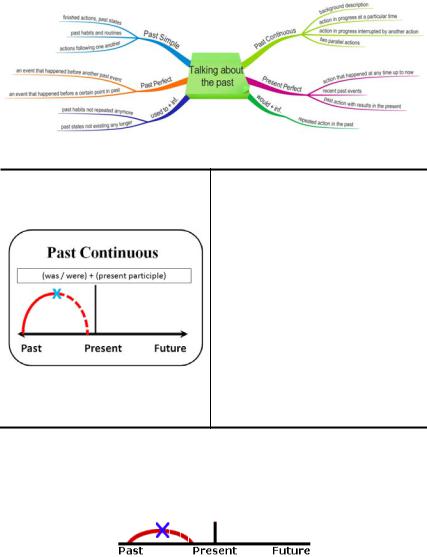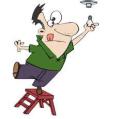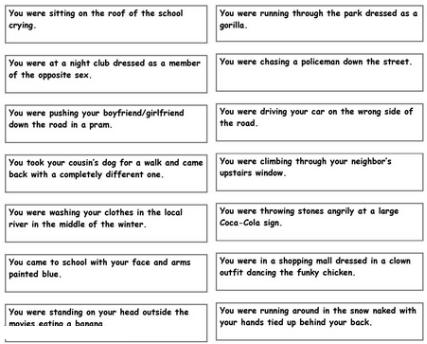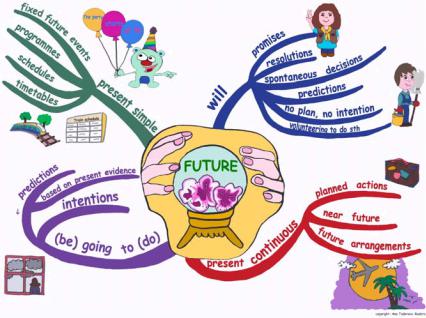
English Grammar in Context
.pdfUSED TO:
THE PAST
She used to work in a shop. He used to watch a lot of TV. They used to be married. There used to be a cinema here. I didn't use to go swimming.
BE USED TO:
I am used to hard work.
I am used to working hard. He is not used to New York.
He isn't used to living in New York. Are you used to fast food?
Are you used to eating quickly
THE PRESENT
Now she works in a bank.
Now he doesn't watch much TV. Now they are divorced.
Now there is a supermarket here. Now I go swimming.
Present Perfect vs. Past Simple
Present Perfect Simple |
Past Simple |
|
|
|
|
Unfinished actions that started in the |
Finished actions: |
|
past and continue to the present: |
I knew Julie for ten years (but then |
|
I've known Julie for ten years (and |
||
she moved away and we lost touch). |
||
I still know her). |
|
|
A finished action in someone's life |
A finished action in someone's life |
|
(when the person is still alive: life |
(when the person is dead): |
|
experience): |
My great-grandmother went to |
|
My brother has been to Mexico |
Mexico three times. |
|
three times. |
|
|
A finished action with a result in the |
A finished action with no result |
|
present: |
in the present: |
|
I've lost my keys! (The result is that |
I lost my keys yesterday. It was |
|
I can't get into my house now). |
terrible! (Now there is no result. |
|
|
I got new keys yesterday). |
|
With an unfinished time word (this |
With a finished time word (last |
|
week, this month, today): |
week, last month, yesterday): |
|
I've seen John this week. |
I saw John last week. |
21

Let’s practice
1.Make past simple ‘wh’ questions:
1.(where / you / go to school?)
2.(when / she / arrive?)
3.(why / he / eat so much?)
4.(what / they / do yesterday?)
5.(who / you / meet at the party?)
2. Put the verbs into the correct form (simple past or present perfect).
My friends (visit) _________
the Grand Canyon National Park last year. I (be / never) ________ to the Grand Canyon National Park. But I (see) ________ lots of wonderful pictures. And yesterday I (buy)
________ a book about the Grand Canyon. I (read) _______ 30 pages already. It's really interesting.
3. Write the verbs in the correct tense (Simple Past or Present Perfect).
My friend (go) ___________ to Edinburgh three times. Some years ago he (study) __________ English there. Last month he (visit) ________
some friends in Edinburgh. Unfortunately, I (can / not)
________ go to Edinburgh with him. This is a pity. They are my friends, too, and I (see / not) _________ them for ages.
4. Work in pairs. In turns talk about the suggested topic for about one minute. Use Present Perfect and Past Simple.
1)A beautiful place you have visited
2)A film you have enjoyed
3)A friend you have known for a long time
4)Something you have stopped doing
5)Something you have done recently
22
5. Fill in the blanks with used to or a form of be used to.
1.My parents ______________ (travel) to other countries when they were young, but now they ____________ (go) to places that are nearby.
2.This street ___________ (be) very dark until the new lights were installed.
3.He doesn't have any problem getting to work at 8:00 in the morning because he _____________ (get up) early.
4.Once grandparents, parents and __________ (live) together, but now grandparents __________ (live) by themselves.
5.At one time American mothers _________ (hope) their sons would grow up to become President.
6.Before he became ill, he _________ (play) tennis every morning.
23

U n i t 4
PAST CONTINUOUS / PAST PERFECT /
PAST PERFECT CONTINUOUS
Past Continuous
was / were + -ing is the past continuous
(+)
I / he / she / it was cooking
We/you/they were playing
(?) |
|
|
Am |
I |
working? |
Is |
he /she / it |
cooking? |
Are |
we / you / they |
playing? |
(–) |
|
I / he / she / it |
I / he / she/ it |
was not cooking |
wasn’t cooking |
We / you / they |
We / you / they |
were not playing |
weren’t playing |
We use Past Continuous:
1) to indicate that a longer action in the past was interrupted. The interruption is usually a shorter action in the Simple Past. Remember this can be a real interruption or just an interruption in time
Example: I was watching TV when she called.
24

2) to describe an action happening at a specific time
Example: Last night at 6 PM, I was eating dinner.
3) to express the idea that both actions were happening at the same time Example: I was studying while he was making dinner.
4) with a series of parallel actions to describe the atmosphere at a particular time in the past
Example: When I walked into the office, several people were busily typing, some were talking on the phones, the boss was yelling directions, and customers were waiting to be helped.
Past Perfect Tense |
Past Perfect Continuous Tense |
|||||||
|
|
|
|
|
|
|
||
(+) I / we/ you / |
had |
driven / gone / |
(+) I / we / |
had |
been |
driving |
||
they / he / she / |
|
worked |
you / they |
|
|
|
||
it |
|
|
he / she / it |
|
|
|
||
(?) Had I / we/ you / |
driven / gone / |
(?) |
I / we / you / |
been |
driving? |
|||
they he / she / it |
worked? |
Had they / he / |
|
|
||||
(–) I / we/ you / |
hadn’t |
driven / gone / |
|
she / it |
|
|
||
they/ he / she / it |
|
worked |
(–) I / we/ |
hadn’t |
been |
driving |
||
|
|
|
you / they / |
|
|
|
||
|
|
|
he / she / it |
|
|
|
||
We use Past Perfect |
|
We use Past Perfect Continuous |
||||||
1) to express the idea that something |
1) to |
show |
that something |
started |
||||
occurred before another action in the |
in the past and continued up until |
|||||||
past. It can also show that something |
another time in the past. |
|
||||||
happened before |
a specific time in |
Example: They had |
been |
talking |
||||
the past. |
|
|
||||||
|
|
for over an hour before Tony |
||||||
Example: I had never seen such a |
||||||||
arrived. |
|
|
|
|||||
beautiful beach before I went to |
|
|
|
|
|
|||
Kauai. |
|
|
2) to show cause and effect if the |
|||||
2) to show that |
something started |
action happened before another one. |
||||||
Example: Jason was |
tired |
because |
||||||
in the past and continued up until |
||||||||
he had been jogging. |
|
|
||||||
another action in the past (non- |
|
|
||||||
continuous verbs). |
|
|
|
|
|
|
||
Example: We had had that car for |
|
|
|
|
|
|||
ten years before it broke down. |
|
|
|
|
|
|||
25

Past Continuous vs. Past Perfect Continuous
Past Continuous emphasizes interrupted actions, whereas Past Perfect Continuous emphasizes a duration of time before something in the past. Study the examples below to understand the difference.
Compare:
1. He was tired because he was exercising so hard.
This sentence emphasizes that he was tired because he was exercising at that exact moment.
2. He was tired because he had been exercising so hard.
This sentence emphasizes that he was tired because he had been exercising over a period of time. It is possible that he was still exercising at that moment OR that he had just finished.
Let’s practice
1. Use Past Continuous to describe actions happening at a specific time in the past.
1.A: What (you, do) ______________ when the accident occurred?
B: I (try) _______________ to change a light bulb that had burnt out.
2.When I phoned my friends, they (play)
_____________ monopoly.
3.Yesterday at six I (prepare) ________________
dinner.
4.They _________ (not sleep) at five o'clock.
5.Peter _________ (work) when I telephoned.
6.Tim __________ (study) German while they were studying French.
2.Choose the correct time expression used with the past continuous
tense.
1.What were you doing (while / during) the meeting?
2.Tim was finishing the report (in / at) five o'clock.
3.They were discussing the problem (when / at) I walked into the room.
4.Jackson wasn't listening (while / during) he was explaining the situation.
5.Was Alice paying attention (while / during) the presentation?
6.They were having a quiet breakfast (this / at) morning when he
arrived.
26

3.My memorable event. The sentences are mixed. Put them in the correct order to make a story.
1My most memorable event was my trip to Africa with my family last November.
We happily changed into shorts and sandals, ate some dinner, and went to sleep. While we were driving there, he told us that the reserve is a park with over 100 different kinds of animals. I was taking a photo of the giraffe when a zebra
started running toward our truck. Five minutes after we entered the park, we saw a giraffe and two zebras. When we arrived on Monday night, rain was falling, but it was quite hot. On Wednesday, we drove through the Great Rift Valley to another park for a three-day safari. On Tuesday, our guide picked us up in a big truck. At first, we were very frightened, but the guide said, “Don’t worry – zebras are not very dangerous!”
After the safari ended, I was happy to return home. He drove us to Kenya’s first nature reserve, which opened in 1946. Before we began the safari, some lions were watching our truck.
4.Describe your memorable event. Use Past Simple and Past Continuous.
5.Why were you doing this?
27
6. Choose the past perfect, or the past simple:
1.We had already eaten when John ___________ (come) home.
2.Last year Juan ____________________________ (pass) all his exams.
3.When I _________ (get) to the airport I discovered I had forgotten my passport.
4.I went to the library, then I ______ (buy) some milk and went home.
5.I opened my handbag to find that I ______ (forgot) my credit card.
6.When we _________ (arrive) at the station, the train had already left.
7.Choose the past perfect, or the past perfect continuous
1.When we arrived the film _____________________________ (start).
2.She _________ (work) in that company for twenty years when she was made redundant.
3.I felt ill because I ______ (drink) six cups of coffee.
4.I _______________________________ (study) all day, so I was tired.
5.How long ___________ (you / live) in London when your daughter was born?
6.When I arrived at the airport I realised I __________________ (forget) my passport.
28

U n i t 5
FUTURE FORMS
Present Simple vs Present Continuous
|
Present Simple |
Present Continuous |
Timetables and programmes: |
Fixed arrangements for the future: |
|
|
Examples |
Examples |
• |
The film begins at 4. |
• We’re flying to New York |
• |
The train leaves at 5. |
tomorrow. |
|
|
|
29

Going to vs. Future Simple
Simple Future has two different forms in English: “will” and “be going to.” Although the two forms can sometimes be used interchangeably, they often express two very different meanings. These different meanings might seem too abstract at first, but with time and practice, the differences will become clear. Both “will” and “be going to” refer to a specific time in the future.
Going to |
Future Simple (will) |
1. to describe an action intended to be performed in the near future
He’s going to take a few days off next week.
• We’re going to buy a new house next summer
2. to make a prediction based on evidence
Look at the baby! He’s going to eat that worm!
1. to express spontaneous decisions
• A: I'm so tired. I'm about to fall asleep.
B: I'll get you some coffee.
2. to express a voluntary action, requests, offers, promises, threats, etc.
• I will send you the information when I get it.
3. to make predictions about the future
• John Smith will be the next President.
30
